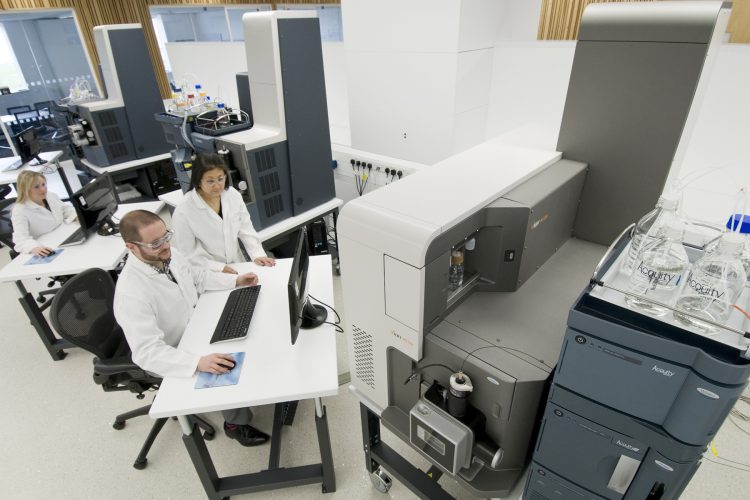The fundamental importance of mass spectrometry to our food
- Like
- Digg
- Del
- Tumblr
- VKontakte
- Buffer
- Love This
- Odnoklassniki
- Meneame
- Blogger
- Amazon
- Yahoo Mail
- Gmail
- AOL
- Newsvine
- HackerNews
- Evernote
- MySpace
- Mail.ru
- Viadeo
- Line
- Comments
- Yummly
- SMS
- Viber
- Telegram
- Subscribe
- Skype
- Facebook Messenger
- Kakao
- LiveJournal
- Yammer
- Edgar
- Fintel
- Mix
- Instapaper
- Copy Link
Posted: 10 July 2017 | Naren Meruva | PhD MBA | Senior Business Development Manager Food & Environmental | Waters Corporation, Roy Manuell | Junior Editor | No comments yet
Naren Meruva, PhD, MBA, Sr. Business Development Manager, Food & Environmental, Waters Corporation discusses exclusively with New Food the importance of mass spectrometry to the food industry.


Following the many announcements Waters made at the American Society for Mass Spectrometry (ASMS), could you tell our readership a little more about what some of these mean for the company but also the wider world of mass spectrometry?
Waters’ theme at 2017 ASMS was “advancing the use of mass spectrometry for delivering benefit for everyday life”. Waters continues to innovate analytical technologies that can be applied to a range of fields that have a huge impact on our quality of life, safeguarding our food and water supplies, protecting the environment and advancing healthcare. One of the highlights for Waters at ASMS within the food markets was the introduction of LiveID software for REIMS (Rapid Evaporative Ionisation Mass Spectrometry) with iKnife sampling which provides near-instantaneous, direct-from-sample measurement and classification of food products to help laboratories detect food fraud and ultimately protect the consumer. Another highlight was the addition of the DART source (Ionsense) for the QDa mass detector which provides rapid direct analysis capability for real time MS profiling and food authentication.
Why is mass spectrometry so important to the food industry?
Mass spectrometry plays a key role as a measurement technology in detecting and mitigating risks to our food supply. Due to the natural complexity of food samples, chromatography and mass spectrometry techniques are essential in food safety testing for determination of contaminants, in food research and foodomics for development of healthier food products and in food QC laboratories to verify the nutritional content and label claims. With increasing consumer demand for food products with health and nutritional benefits, it’s important to have analytical technologies like mass spectrometry that are selective, sensitive, robust and accessible to support food manufacturers to protect their brands and regulators to mitigate the risk of food fraud and adulteration.
If you had to identify the single greatest challenge we face in the food industry, what would you suggest?
Consumers’ awareness and expectations of the quality and nutritional content of foods, beverages and dietary supplements are higher than ever before. Addressing the increasing consumer demand for safe and authentic food and the increasingly expansive regulatory landscape presents a variety of scientific and operational challenges for the food manufacturers. One of the greatest challenges from an analytical testing point of view is the variability in global food safety regulations and developing methods for a wide variety of food types or matrices to meet the requirements of both domestic and the international food trade markets.
At Waters, which technological advancements are you specifically excited about at present?
Recent advances in mass spectrometry technology have focused on improving instrument usability and robustness for solving today’s scientific and operational challenges in the food testing laboratories. At Waters we are really excited about the implementation of ion mobility separation with high resolution mass spectrometry. This technology allows an extra dimension of separation which helps to deal with complex food matrices. Also ion mobility provides an extra measure of confirmation to be performed during the analysis using collision cross section (CCS) values. This physiochemical property provides additional confidence in the identification of contaminants in food samples.
Imagine we are having this conversation in 5 years’ time, what do you hope to have changed in the wider food and beverage industry from the perspective of scientific innovation?
With rising consumer demand for safe, quality and authentic food and the increasing global food regulations, we hope to see a greater adoption of mass spectrometers in routine food testing. MS offers unsurpassed selectivity for detection of analytes of concern in food samples. With advances in technology we hope to improve laboratory productivity, data integrity and overall efficiency in the food testing labs. Waters has already made strides towards this future with our QDa mass detection technology as it is a robust, reliable, cost effective and fit for purpose system that can be used by both MS experts and non-experts for their chromatography based food testing. We also hope to see a greater adoption of high resolution mass spectrometry in food testing as the labs are challenged to screen for more known and unknown compounds in each samples with faster turnaround times.
Related topics
Food Fraud, Food Safety, Liquid chromatography–mass spectrometry (LC-MS), Quality analysis & quality control (QA/QC), Sensory technology, Spectroscopy, Technology & Innovation








